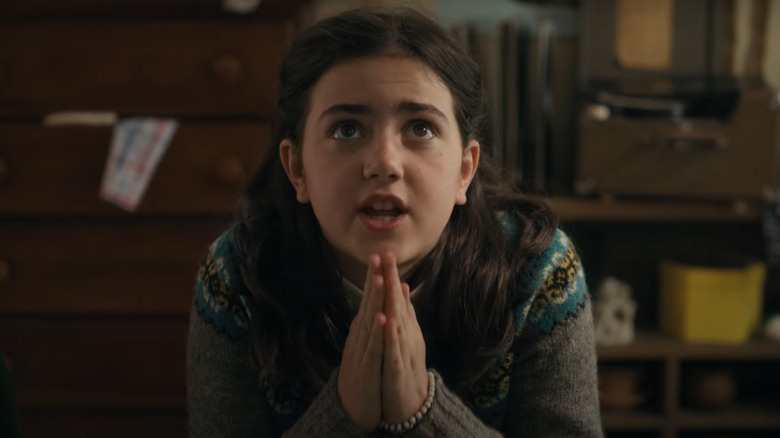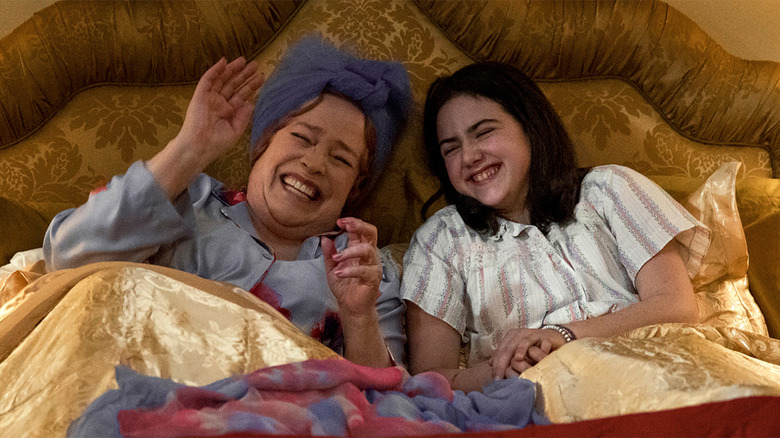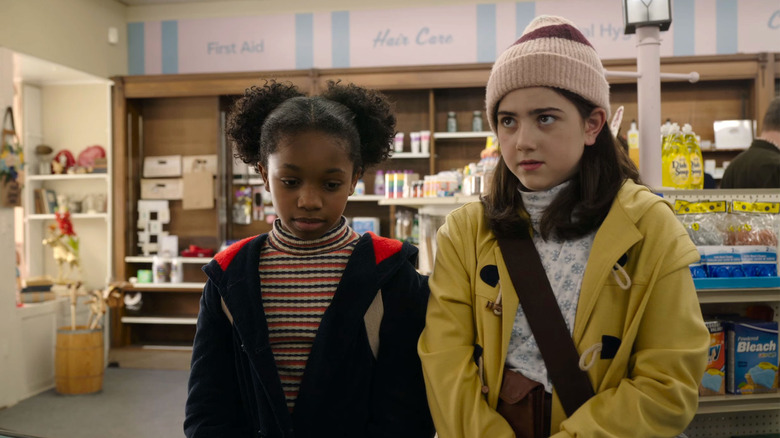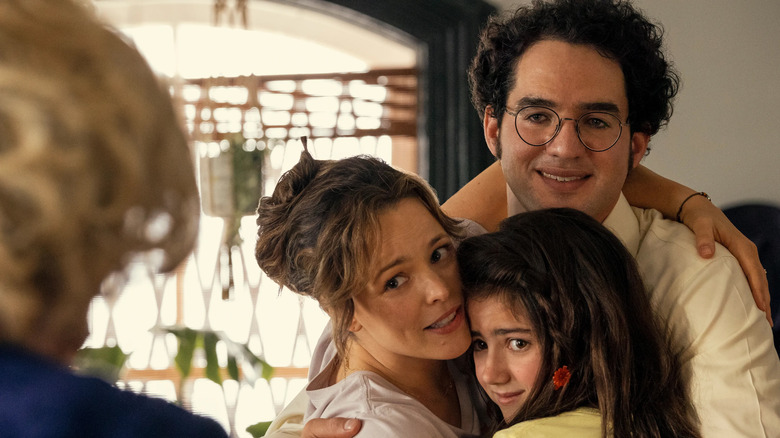Are You There God? It's Me Margaret Director Kelly Fremon Craig Can Feel Your Pain [Exclusive Interview]
Filmmaker Kelly Fremon Craig can feel your pain.
She felt it when she wrote and directed the agonizing, hilarious "The Edge of Seventeen," one of the best teen movies of the 21st century so far. And she affirms her uncanny ability to tap into the crushing humiliations and tiny victories of childhood with her adaptation of Judy Blume's "Are You There God? It's Me, Margaret," one of the first great movies of 2023. You don't have to be a fan of the original novel and you don't need to have once been an 11-year-old girl to find shreds of yourself in the film, which follows the title character as she suffers and triumphs over the course of a tumultuous year, seeking (and generally not finding) solace from some kind of higher power. It's the kind of coming-of-age triumph that feels like an immediate all-timer.
I recently sat down with Craig during a press day in Austin, Texas, roughly seven years after I spoke to her about her debut with "The Edge of Seventeen." While I was curious what she's been up to in the years between films (short answer: She's been quietly fixing the scripts for a ton of major movies), the bulk of our conversation focused on the empathy of her filmmaking and how "Are You There God? It's Me, Margaret" so astutely captures the defining aspects of childhood we often write off as embarrassing — specifically, how monumental even the most basic aspects of existence feel when you aren't armed with adult knowledge.
No one makes coming-of-age movies like Craig. And the reason why — her empathy — was evident throughout our conversation.
Note: This interview has been lightly edited for clarity and brevity.
'I so want to kill that dead. I am so desperate to kill that dead'
When I interviewed you and [executive producer James L. Brooks] for "The Edge of Seventeen," he said the key to a universal story is specificity. This movie is nothing but specific moments. I was not an 11-year-old girl in 1970, but everything felt so granular to the point where I cringed and I laughed and I recognized it. Can you talk about finding those moments?
I think that's the magic of Judy Blume. That's why I fell in love with her books. There was so much truth in those details. I found myself in those, so in a lot of ways I was trying to deliver her. You know what I mean? And in a lot of ways when I think about it, she shaped me as a writer, because I got, at that age, how important that was, to see yourself reflected in those little details. All those things are important to me.
I also like the tiniest things. I like, especially at this age, to see all the messiness. I liked that her hair was not done great, and it was greasy. I liked that people's clothes are rumpled and their shoes are dirty, those type of things. There was actually one thing that just knocked me out. When I walked into the costume room and Anne Roth, who's a legendary costume designer, just being in her presence, you learn so much, but I walked in and she had put Margaret in one dingy, white sock and one clean, white sock. And I said, "That is it. That is it. That's the age. That's exactly right." And that's a detail that probably no one ... it doesn't really show up anywhere in the movie, but I know that it's right, and that feels good.
In this film and in "The Edge of Seventeen," there's a detail I wish more coming-of-age movies really latched onto: How when you're that age, every day is the most important day of your life, and every event is a defining moment. There's no such thing as yesterday or tomorrow. Today is all that matters.
Yes, exactly. I feel like the stakes feel so enormous at that age. Everything feels like life and death. And when you look back, you can laugh, because it's kind of funny, but at the time it's not at all.
There's an empathy in this movie about this. I think a lot of people my age reach an age where it's like, "Man, I was such an idiot when I was a kid," as opposed to thinking, "I wasn't an idiot. I was working with what I knew, and what I knew was not enough."
Yes, yes. Oh, I think that's so beautifully articulated. That is exactly right. You're working with what you know. You're doing the best you can with the tools you have, which are not many at that age. At least I didn't have many.
And I will say that when I was younger, when I was a kid, I didn't read this book. And I'll be perfectly honest. Growing up, even the librarian told me, "Oh, that's a girl's book."
Yes, uh-huh. [nodding with recognition]
Now see a lot of parents my age who are making sure their sons are reading stories with female heroes, reading books by female authors, and the tide is shifting.
I'm so glad.
Can you talk about how you wanted to make a movie to make sure we kill that dead, the idea of there being a "girl book" or a "girl movie"?
I so want to kill that dead. I am so desperate to kill that dead. Because there is this feeling that if you're a girl, you can watch a boy movie, but if you're a boy, you can't watch a girl movie. And I think that's so silly and ridiculous. But I have to say, what's exciting about this is, when boys and men do come to see it, I think most of them walk in, "Oh, this is not going to be for me," and then they're surprised. They're surprised that they relate. So it's exciting to see that surprise, but I hope we get to a place where they're not surprised.
Back to specificity, I cannot directly relate to Margaret's events, but the very small humiliations and triumph are things that I feel in my heart.
Yes, totally. Yeah, me too.
'I find something very reassuring about witnessing someone else's mess because I'm like, 'Thank God, you too''
I want to talk about you as a filmmaker. I feel like film journalists are invested in flashy filmmaking, "Oh, look at that 10-minute long tracking shot," but I love how you shoot your movies. Your camera serves the characters. Your camera seems to ask, "Where can I serve these characters in their emotional needs in this moment?" Can you talk about your filmmaking choices and how you choose to film your actors and make sure you're getting to the emotion of these scenes?
That is ... I'm so glad you noticed that, because I really do think that way. I've never said to myself, "Ooh, you know what would be cool? If we shot it like this." I don't think in terms of cool film stuff or even aesthetic design. Everything is just is gut level, sort of emotionally based. It's like, "Where do I emotionally want to be in the scene?" Sometimes I want to be right up with someone where it feels almost too intimate, too close. Other times I want them to be just teeny tiny in the frame where you just feel like there's all this empty space around them, and it's sort of like there's a loneliness. It makes me feel lonely when I look at it. So everything is very, "How does it make me feel?" I'm constantly referring back to this part of my myself and waiting for a certain feeling to happen. And when it clicks, I'm like, "There it is." So I'm moving around the place trying to figure that out.
Without going into spoilers, this movie is very deliberately messy. It just unapologetically says, "Hey, things don't get fixed in a year. Maybe they get a little bit better or a little bit worse, but they're not going to be perfect." Can you talk about the decision to lean into that?
Well, I think that's also a wonderful attribute of Judy Blume, is that her books felt really slice-of-life in that way. They weren't neat and tidy. You were just following along on someone's life journey. I think that's part of why they resonated with me so much, is because they felt like my life. They felt messy, like my life. I find something very reassuring about witnessing someone else's mess because I'm like, "Thank God, you too." You know what I mean? Not everything works out, and it is. Life is messy.
One of my writers on the site has a weekly column called Best Actor Ever, and last week's edition was "Rachel McAdams is the Best Actor Ever."
Oh, I'm so glad.
I feel like people took her for granted for a long time. I think we're trying to realize, "Oh, is she actually one of the best of her generation?"
I think she is. I think she is, without a doubt, one of the best of her generation. I have to say, her performance in this knocked me flat. I swear to God, I think I spent every day she was on set crying at the monitors. And it wasn't even because she was ... It wasn't even a particularly sad scene. It was just she has a way of rendering the truth in a way that just slayed me. In particular, what struck me was she was able to capture all the layers of what it is to be a mom. Desperately wanting to do right by your kid and not being sure if you're doing it all right and grappling with your own maternal guilt and trying to figure out if you can serve the part of you that loves your work and your art and also still be a good mom.
That's a question I ask myself all the time, and I'm constantly trying to balance and feel like I'm constantly failing at, but I'm trying. Every day I'm trying to do that better. Watching her capture all of that, an experience that is so personal to me, was really moving and emotional to me throughout the whole process.
'I felt a crushing pressure to do that, to get that right...'
Can you humor me? One of my writers, who's a big Judy Blume fan, who's a big YA fan in general, was trying to get an interview with you in Los Angeles and kept on getting stonewalled through email. She sent me some of her questions. Can I just read them word for word for you?
Yes. Absolutely.
If she could have made it happen in L.A., I probably wouldn't be here, because she is incredibly qualified.
Oh my gosh.
Her heart was broken when she couldn't get this, so I'll just read hers word for word.
Oh my God. Absolutely, yeah.
[reading question] Judy Blume is a literary legend, and has been helping girls navigate these horrible, wonderful, awkward years for generations. How did you incorporate the weight of that influence into your take on what is arguably her magnum opus?
It is her magnum opus. I have to say, at first sitting down to write the script, I felt a crushing pressure to do that, to get that right, because I know so many people care deeply about this book and would be really pissed off if I screwed it up. At some point my guiding light became, if I could just make the scene feel the way the scene in the book makes me feel, then I'm doing right by it. That made me feel like I was delivering the spirit of it, even as I had to change things, which you have to change things. You have to condense, and you have to make choices when you adapt something. So that's how I got over my own self-consciousnesses during the creative process.
[reading question] There's also a serious lack of coming-of-age films targeted toward tween girl audiences. How did that scarcity impact your approach of crafting the film?
There really is. I really just wanted to be as honest as humanly possible. I wanted most of all to show this age as it is, because that's what Judy Blume did. That's also what honestly I'm trying to do in every film I'll ever make. I'm trying to show it as it really is, warts and all. So yeah, I think I was just trying really hard to get the details right.
[reading question] There's been a lot of talk in recent years about adults healing their inner child, but we often forget about our teen and tween selves that are also part of the conversation. How was working with the coming-of-age space impactful to your relationship with your teen self?
Oh, I love that. I feel like my teen and tween self lives at the center of me every day. I really do feel like I'm constantly, as I embark on new things in my life, new challenges, new life transition, I feel like that 12-year-old that's awkward and unsure and thinks everybody has it figured out, but me ... I feel that way again and again. But I think the process of making this film has made me have more empathy for her and not be so frustrated or disappointed that I still feel that way, to more just say, "That's life. You feel that way again and again and again and again until you die." And maybe that's living. Every time you stretch and grow, you have to feel awkward and not sure and self-conscious and not sure if you're getting life right.
I know we talked about this a little bit earlier already, but the idea ... when you're 11 years old, you just don't know that 10 years from now, it's going to be totally fine.
Yes. You don't know that. What's weird is I actually think even as an adult sometimes you forget that. Sometimes when I'm in the middle of a crisis, it feels like it'll be forever. It's a weird thing. You have to tell yourself, "This too shall pass." There's a reason that phrase exists, because we have to say it like a mantra to ourselves I think sometimes, to get through certain periods. I do think it's easier when you're older, but it's taken me a lot of practice.
'I loved the way she searches for something greater, and I love that she doesn't find it in these traditional spaces'
I'm a non-religious person, but I would be lying if I didn't beg the universe for some kind of consistency at some point in my adult life, so I think we're all talking to God in some way.
Yes. And honestly, that is the big reason I wanted to make the film. I loved the way she searches for something greater, and I love that she doesn't find it in these traditional spaces. She finds it within herself. She finds it alone in a room. It evolves. She doesn't know how she feels about it. That's my experience with something greater, that I still don't know quite how to name it or what to call it. My feelings about it evolve constantly. Some days I think there's a divine order to all this. Other days, when tough things happen, I think, "I don't know, man." I'm swinging between both those things all the time, but I'm constantly curious and searching about why we're all here and ... that big life question is always at the center of me, probably to the point where I should put it down sometimes, but I can't. It's everywhere.
I've got to ask the requisite "here to do my job" question. So in the years since "Edge of Seventeen," I've noticed your name crop up next to some occasionally big franchise stuff that never quite seemed to come together. Was there a big one you really wanted that got away?
Well, I actually do a ton of uncredited rewrites on these different franchise-y things. So it's a very strange thing as a writer, because you can do a bunch of writing on something, but you don't get credit. You're just serving the project. And I do a lot of these production weeklies. So basically you're kind of an ER script doctor, because it's about to go into production and they're like, "Oh God, the script sucks," or, "We hate the main character," whatever. "Please help." I don't know what it is about me, but I really like working in that kind of pressured, emergency situation. There's something about it that electrifies me. I love the process. So on several of these, I jump in and try to just be a pair of helping hands and breathe some life into things and then ... that's a lot of what I've been doing in these last few years, and then making this.
That's also what Carrie Fisher did for a large portion of her career, and I also know that there's a lot of really successful female editors. I'm wondering if that's a sign of Hollywood, that men are making these big movies, but they need women to come clean them up? Am I saying too much?
Oh, that's a good question. I don't know. I don't know. I've worked on all sorts of different things, for men, for women. I like the process of just being a helper who comes in when it's fire drills. It's fun. It's fun. And also on some of those bigger films, it's exciting to be a pair of a hands.
So what's next? I hope it's not another seven years. I really don't want to wait for that.
I know. I know, totally. There are a couple different things that I'm circling, but I haven't committed to anything yet. And part of the reason is, I really believe in taking a second to just go be on input instead of on output. You know what I mean? I've been on output for the last stretch of years, trying to birth this baby, and I think I need to just spend a couple months being a human being in the world and being inspired by life and figuring out what it is that I need to write, where I have just a burning desire to write it. There's two things really in my brain. I don't know which one I'll go for, so I'm letting life lead me towards it. So we'll see.
"Are You There God? It's Me, Margaret" opens in theaters on April 28, 2023.




